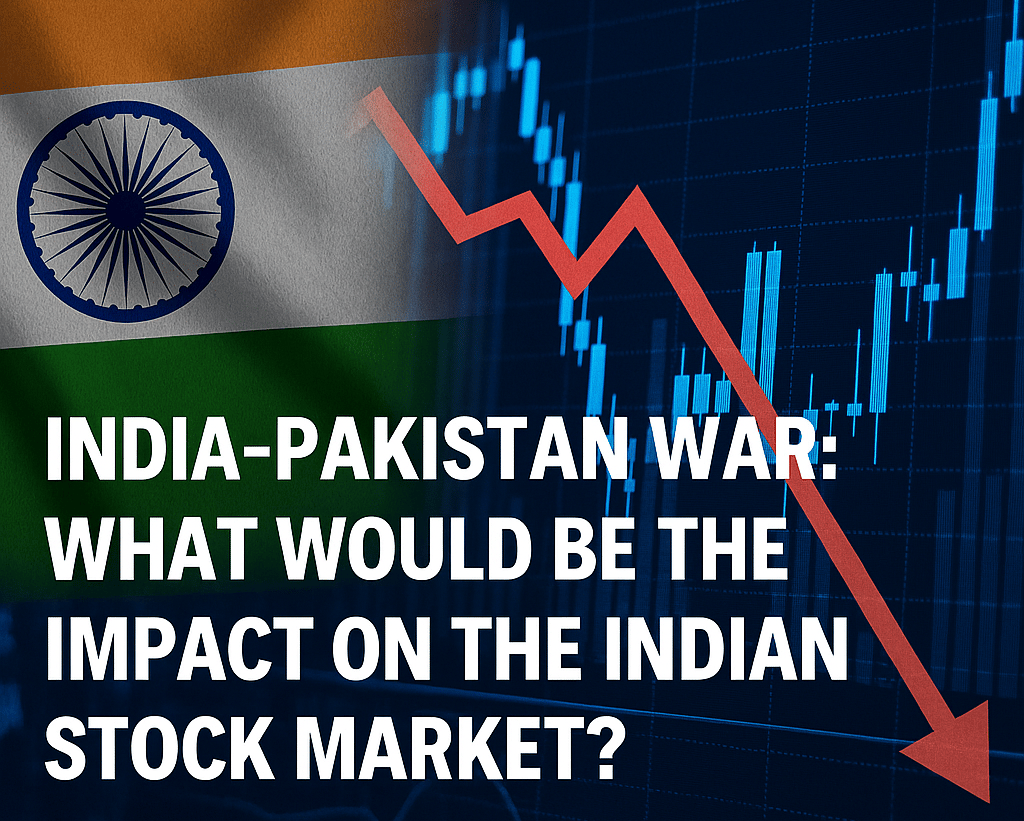India-Pakistan War and Its Hypothetical Impact on Indian Stock Market (2025 Analysis)
5/2/20253 min read


India-Pakistan War: What Would Be the Impact on the Indian Stock Market?
Geopolitical tensions between India and Pakistan have long been a sensitive and critical concern in South Asia. While actual war is not inevitable, rising border tensions or military conflicts can trigger a chain reaction across the financial ecosystem. In this blog, we explore a hypothetical India-Pakistan war scenario and analyze what its likely impact would be on the Indian stock market.
Understanding how markets react during geopolitical crises is crucial for investors, traders, and portfolio managers. History shows that uncertainty, fear, and volatility dominate in the early stages — followed by sector-wise divergence and eventual recovery.
Historical Examples: How Did Markets React During Past Conflicts?
India has faced multiple conflicts in the past, and each had a unique but instructive impact on the financial markets.
1.Kargil War (1999)
The Kargil conflict, while intense, had a limited long-term impact on the Indian stock market. The Sensex dipped briefly due to uncertainty but recovered once the situation stabilized. The overall economic fundamentals remained resilient.
2.Indo-Pak War (1971)
The 1971 war was marked by volatility in global oil prices, economic uncertainty, and a drop in investor sentiment. However, the Indian economy was less integrated with global markets then, limiting the stock market’s immediate impact.
3.Surgical Strikes (2016)
Markets witnessed a short-term sell-off following India’s cross-border strikes. However, by the next trading session, indices stabilized, highlighting that markets tend to price in events quickly.
Short-Term Market Reaction: Panic and Volatility
If an India-Pakistan war were to occur in 2025, the immediate stock market impact would be negative due to heightened uncertainty. The primary reactions would include.
Panic selling by retail investors
Spike in volatility index (India VIX)
Fall in benchmark indices like NIFTY and Sensex
Withdrawal of funds by Foreign Institutional Investors (FIIs)
Transition words such as “therefore,” “as a result,” and “in contrast” would become common in analyst commentaries, indicating shifts in investor mood and policy direction.
Sector-Wise Impact Analysis
Not all sectors react the same way during wartime. While some suffer sharp declines, others often outperform due to demand for their products or services.
Likely to Be Negatively Impacted:
Banking & Financials: Loan defaults may rise, and credit demand could fall due to uncertainty.
Aviation & Tourism: Border instability and travel advisories would likely hurt this sector.
Auto: Sluggish demand and disrupted supply chains could hurt automotive production and sales.
Consumer Durables: People may postpone large purchases amid fear of war escalation.
Likely to Outperform or Stay Stable:
Defense & Aerospace: Stocks like Bharat Dynamics, Hindustan Aeronautics, and BEL often surge on news of military engagement.
Pharmaceuticals: Seen as a defensive sector; demand remains stable or grows due to exports and domestic needs.
Energy (Oil & Gas): While global oil prices may spike, energy companies often benefit from price fluctuations and storage gains.
Therefore, diversification becomes essential for investors during geopolitical instability.
Global Reactions and FII Sentiment
Foreign investors typically exit emerging markets when geopolitical risk rises. India, being a large recipient of FII inflows, could see:
Capital flight to safe havens like gold, USD, and U.S. bonds
Currency depreciation, weakening the rupee
Outflow from equity mutual funds and ETFs
However, long-term investors often see these dips as entry opportunities, especially if the macroeconomic fundamentals remain intact.
How Long Do Markets Take to Recover?
Markets are known to be forward-looking. While immediate reactions may be severe, historical data shows recovery typically begins within weeks or months, depending on:
War duration
Economic resilience
Diplomatic outcomes
Government stimulus or central bank response
For instance, post-Kargil and post-surgical strike corrections lasted no more than 10–15 trading sessions before a sharp rebound.
How Should Investors Prepare?
Investors should approach such events with caution, not fear. Here’s how to stay prepared:
Diversify your portfolio: Include defensive sectors like pharma and FMCG
Avoid emotional trading: Stick to your investment strategy
Keep emergency funds liquid: Avoid full equity exposure
Monitor currency and crude oil: These act as war barometers for the Indian economy
Consider SIPs: Continue long-term SIPs to benefit from rupee-cost averaging
Final Thoughts
While no one hopes for war, preparing for geopolitical volatility is an investor’s responsibility. Markets don’t fear war — they fear uncertainty. As history shows, Indian markets have proven resilient even in the face of military conflict. Rational, well-informed investing always outperforms fear-driven decisions.
If such an event were to occur, the best approach would be to remain calm, analyze facts, and seek guidance from experienced advisors. India’s economic backbone remains strong, and so does the long-term potential of its markets.
🔗 Related Blogs:
About One Solution
Quick Links
Contact Info
One Solution — Your trusted partner for financial success.
📍 F17, Grand Plaza, Paltan Bazar
Guwahati, Kamrup (M), Assam
India, Pin: 781008
📞 9650072280
© 2025 One Solution. All Rights Reserved.
